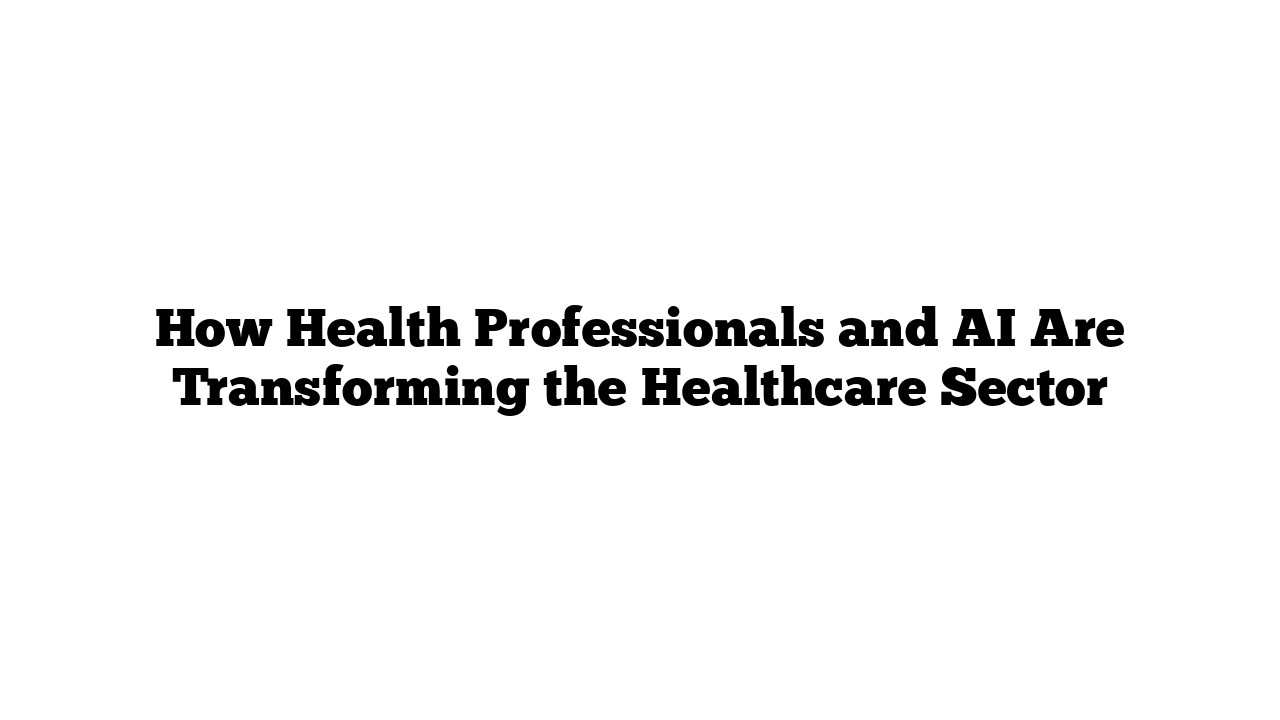The healthcare industry has seen remarkable advancements, with contributions from skilled health professionals and the rising power of artificial intelligence (AI). Together, they’re shaping a more efficient, accessible, and innovative healthcare system. Below, we explore how these elements combine to improve patient care, diagnostics, and overall medical practices.
The Role of Healthcare Professionals in Patient Care
Healthcare professionals are at the core of patient care, providing expertise, empathy, and personalized care. Their skill and dedication are crucial in diagnosis, treatment, and the holistic well-being of patients.
- Compassionate, Personalized Care: Doctors, nurses, and allied health professionals bring a human touch to healthcare that AI alone can’t replicate. “Patient care is more than just diagnosing—it’s about understanding the individual,” says Dr. Sarah Lee, a practicing physician in the USA.
- Advanced Training and Skills: Health professionals bring years of training, experience, and continuous education to provide high-quality care. They are equipped to handle complex cases, offer psychological support, and interpret patient histories, which enhances personalized treatment.
AI’s Rising Influence in the Healthcare Sector
Artificial Intelligence is rapidly becoming a crucial component in healthcare, streamlining processes, supporting diagnostics, and increasing treatment precision. Here are some key areas where AI is making an impact:
- Enhanced Diagnostics: AI algorithms are excellent at detecting patterns in medical imaging, such as identifying abnormalities in X-rays or MRIs. This speeds up diagnosis and improves accuracy.
- Predictive Analytics: AI can analyze large volumes of health data to predict disease outbreaks, enabling preventive measures. For instance, during the COVID-19 pandemic, AI systems tracked outbreaks and helped healthcare professionals respond effectively.
- Administrative Support: AI-powered systems automate administrative tasks, from scheduling appointments to managing patient records, freeing up time for health professionals to focus on direct patient care.
Visit MedicalTimes.io for insights into AI’s applications in healthcare and how professionals are utilizing these tools.
How Health Professionals and AI Work Together
While AI contributes advanced technology and efficiency, healthcare professionals offer the judgment and empathy needed for effective treatment. Together, they create a balanced, patient-centered approach.
- Decision Support: AI provides data-driven insights that help doctors make informed decisions. However, final diagnoses and treatments are overseen by trained health professionals, ensuring safety and accuracy.
- Remote Patient Monitoring: Using AI-driven tools, healthcare professionals can monitor patients remotely. Devices track vital signs, and AI alerts providers to any issues, allowing for timely interventions.
- Telemedicine Advances: AI enhances telemedicine, especially in countries like the USA where rural areas may have limited access to healthcare facilities. Patients can connect with specialists, while AI helps facilitate accurate, virtual diagnoses.
Challenges and Ethical Considerations
Integrating AI into healthcare also brings challenges and ethical considerations. AI lacks human judgment, empathy, and an understanding of patient nuances, making the oversight of health professionals essential.
- Privacy Concerns: AI systems process vast amounts of patient data, raising privacy issues. Medical professionals and institutions must ensure compliance with data privacy regulations.
- Maintaining Empathy in Care: As AI becomes more involved in healthcare, the challenge is to maintain the compassionate, personal interaction that only a human can offer. Patients still need that human connection, especially when dealing with difficult diagnoses.
The Future of Healthcare with AI and Professionals in Tandem
As AI technology advances, the collaboration between AI and healthcare professionals will likely grow, creating a more accessible and efficient healthcare system.
- Medical Research Advancements: AI accelerates research by analyzing medical literature and clinical trial data. This allows health professionals to stay updated on new treatments and share findings, furthering advancements in medicine.
- Public Health Benefits: With AI’s data analytics, healthcare systems can monitor public health trends, detect early signs of outbreaks, and implement preventive measures, which directly benefits global health efforts.
AI and healthcare professionals each bring unique strengths to the table. Health professionals ensure quality and empathy, while AI optimizes efficiency and precision. Together, they create a balanced approach that is transforming healthcare for the better.
For more in-depth articles on the future of healthcare, visit MedicalTimes.io.
